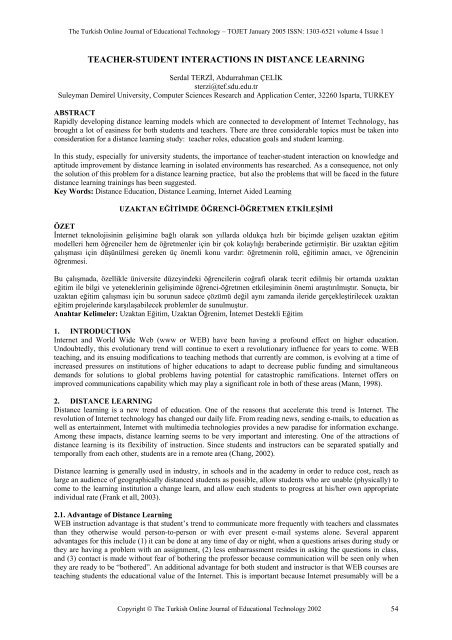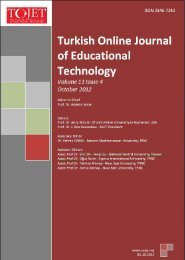Age - TOJET the Turkish online journal of educational technology
Age - TOJET the Turkish online journal of educational technology
Age - TOJET the Turkish online journal of educational technology
You also want an ePaper? Increase the reach of your titles
YUMPU automatically turns print PDFs into web optimized ePapers that Google loves.
The <strong>Turkish</strong> Online Journal <strong>of</strong> Educational Technology – <strong>TOJET</strong> January 2005 ISSN: 1303-6521 volume 4 Issue 1<br />
TEACHER-STUDENT INTERACTIONS IN DISTANCE LEARNING<br />
Serdal TERZİ, Abdurrahman ÇELİK<br />
sterzi@tef.sdu.edu.tr<br />
Suleyman Demirel University, Computer Sciences Research and Application Center, 32260 Isparta, TURKEY<br />
ABSTRACT<br />
Rapidly developing distance learning models which are connected to development <strong>of</strong> Internet Technology, has<br />
brought a lot <strong>of</strong> easiness for both students and teachers. There are three considerable topics must be taken into<br />
consideration for a distance learning study: teacher roles, education goals and student learning.<br />
In this study, especially for university students, <strong>the</strong> importance <strong>of</strong> teacher-student interaction on knowledge and<br />
aptitude improvement by distance learning in isolated environments has researched. As a consequence, not only<br />
<strong>the</strong> solution <strong>of</strong> this problem for a distance learning practice, but also <strong>the</strong> problems that will be faced in <strong>the</strong> future<br />
distance learning trainings has been suggested.<br />
Key Words: Distance Education, Distance Learning, Internet Aided Learning<br />
UZAKTAN EĞİTİMDE ÖĞRENCİ-ÖĞRETMEN ETKİLEŞİMİ<br />
ÖZET<br />
İnternet teknolojisinin gelişimine bağlı olarak son yıllarda oldukça hızlı bir biçimde gelişen uzaktan eğitim<br />
modelleri hem öğrenciler hem de öğretmenler için bir çok kolaylığı beraberinde getirmiştir. Bir uzaktan eğitim<br />
çalışması için düşünülmesi gereken üç önemli konu vardır: öğretmenin rolü, eğitimin amacı, ve öğrencinin<br />
öğrenmesi.<br />
Bu çalışmada, özellikle üniversite düzeyindeki öğrencilerin coğrafi olarak tecrit edilmiş bir ortamda uzaktan<br />
eğitim ile bilgi ve yeteneklerinin gelişiminde öğrenci-öğretmen etkileşiminin önemi araştırılmıştır. Sonuçta, bir<br />
uzaktan eğitim çalışması için bu sorunun sadece çözümü değil aynı zamanda ileride gerçekleştirilecek uzaktan<br />
eğitim projelerinde karşılaşabilecek problemler de sunulmuştur.<br />
Anahtar Kelimeler: Uzaktan Eğitim, Uzaktan Öğrenim, İnternet Destekli Eğitim<br />
1. INTRODUCTION<br />
Internet and World Wide Web (www or WEB) have been having a pr<strong>of</strong>ound effect on higher education.<br />
Undoubtedly, this evolutionary trend will continue to exert a revolutionary influence for years to come. WEB<br />
teaching, and its ensuing modifications to teaching methods that currently are common, is evolving at a time <strong>of</strong><br />
increased pressures on institutions <strong>of</strong> higher educations to adapt to decrease public funding and simultaneous<br />
demands for solutions to global problems having potential for catastrophic ramifications. Internet <strong>of</strong>fers on<br />
improved communications capability which may play a significant role in both <strong>of</strong> <strong>the</strong>se areas (Mann, 1998).<br />
2. DISTANCE LEARNING<br />
Distance learning is a new trend <strong>of</strong> education. One <strong>of</strong> <strong>the</strong> reasons that accelerate this trend is Internet. The<br />
revolution <strong>of</strong> Internet <strong>technology</strong> has changed our daily life. From reading news, sending e-mails, to education as<br />
well as entertainment, Internet with multimedia technologies provides a new paradise for information exchange.<br />
Among <strong>the</strong>se impacts, distance learning seems to be very important and interesting. One <strong>of</strong> <strong>the</strong> attractions <strong>of</strong><br />
distance learning is its flexibility <strong>of</strong> instruction. Since students and instructors can be separated spatially and<br />
temporally from each o<strong>the</strong>r, students are in a remote area (Chang, 2002).<br />
Distance learning is generally used in industry, in schools and in <strong>the</strong> academy in order to reduce cost, reach as<br />
large an audience <strong>of</strong> geographically distanced students as possible, allow students who are unable (physically) to<br />
come to <strong>the</strong> learning institution a change learn, and allow each students to progress at his/her own appropriate<br />
individual rate (Frank et all, 2003).<br />
2.1. Advantage <strong>of</strong> Distance Learning<br />
WEB instruction advantage is that student’s trend to communicate more frequently with teachers and classmates<br />
than <strong>the</strong>y o<strong>the</strong>rwise would person-to-person or with ever present e-mail systems alone. Several apparent<br />
advantages for this include (1) it can be done at any time <strong>of</strong> day or night, when a questions arises during study or<br />
<strong>the</strong>y are having a problem with an assignment, (2) less embarrassment resides in asking <strong>the</strong> questions in class,<br />
and (3) contact is made without fear <strong>of</strong> bo<strong>the</strong>ring <strong>the</strong> pr<strong>of</strong>essor because communication will be seen only when<br />
<strong>the</strong>y are ready to be “bo<strong>the</strong>red”. An additional advantage for both student and instructor is that WEB courses are<br />
teaching students <strong>the</strong> <strong>educational</strong> value <strong>of</strong> <strong>the</strong> Internet. This is important because Internet presumably will be a<br />
Copyright © The <strong>Turkish</strong> Online Journal <strong>of</strong> Educational Technology 2002 54
















